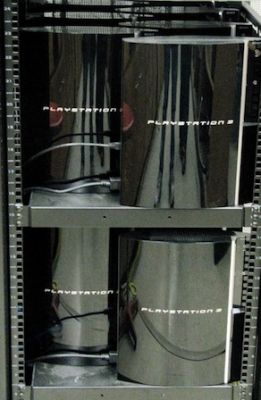
Just a quick post to point you to the BBC's coverage of FQXi large-grant-winner Gaurav Khanna's work, using a Playstation supercomputer to test loop quantum cosmology, find out what happened before the big bang, and predict signs of black holes. (More details in Grace Stemp-Morlock's article: "The Quantum PlayStation".)
You can listen to the piece, broadcast on the BBC Worldservice's Digital Planet, here (Khanna comes in at about the 9 minute mark).
I'm highlighting it here because the host, Gareth Mitchell, picked up on an interesting point: Khanna was able to string together 16 PS3 consoles to create a supercomputer because, until recently, the PS3 was an open platform, running LINUX, which could programmed for scientific tasks. Now, however, SONY have shut down this functionality--possibly because hackers managed to exploit it to run pirate games.
So, sadly, it won't be so easy for others to follow Khanna's example and create their own PS3 supercomputers in the future. The programme has a bit of a discussion about whether SONY should feel more obliged to help the progress of foundational physics research. The answer seemed to be, realistically, probably not. But I thought I would throw it out there for you.